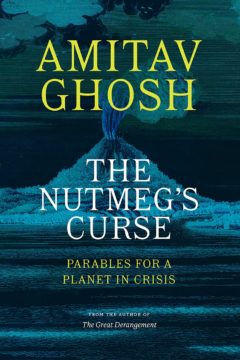Rhoda Feng at The White Review:
 What often gets left out of chronicles about the Banda Islands, of which there are not many to begin with, are the perspectives of Bandanese survivors of the 1621 genocide, and their efforts to remember the past through stories and song. As Ghosh writes, ‘the modern gaze sees only one of the nutmeg’s two hemispheres… [it] is merely an inert object, a planet that contains no intrinsic meaning, and no properties other than those that make it a subject of science and commerce.’ THE NUTMEG’S CURSE shows us the hemisphere cast in a penumbra. Throughout the book, the chiaroscuro effect is extended to certain words as well, like ‘nature’, whose Western conception, Ghosh observes, ‘is the key element that simultaneously enables and conceals the true character of biopolitical warfare.’ The Bandanese have a very different relationship to nature, they view their islands as ‘places of dwelling that were enmeshed with human life in ways that were imaginative as well as material.’ Ghosh quotes the Indigenous thinker Max Liboiron, for whom land is ‘the unique entity that is the combined living spirit of plants, animals, water, humans, histories, and events.’ This is a ‘vitalist’ way of seeing the world that recognises the agency of material things. It’s also a view that any reader of Ghosh’s work implicitly senses. For those new to his writing, THE NUTMEG’S CURSE is not just a ‘parable for planetary crisis’, but also, albeit to a lesser extent, a kind of onboarding manual for his Ibis triple-decker.
What often gets left out of chronicles about the Banda Islands, of which there are not many to begin with, are the perspectives of Bandanese survivors of the 1621 genocide, and their efforts to remember the past through stories and song. As Ghosh writes, ‘the modern gaze sees only one of the nutmeg’s two hemispheres… [it] is merely an inert object, a planet that contains no intrinsic meaning, and no properties other than those that make it a subject of science and commerce.’ THE NUTMEG’S CURSE shows us the hemisphere cast in a penumbra. Throughout the book, the chiaroscuro effect is extended to certain words as well, like ‘nature’, whose Western conception, Ghosh observes, ‘is the key element that simultaneously enables and conceals the true character of biopolitical warfare.’ The Bandanese have a very different relationship to nature, they view their islands as ‘places of dwelling that were enmeshed with human life in ways that were imaginative as well as material.’ Ghosh quotes the Indigenous thinker Max Liboiron, for whom land is ‘the unique entity that is the combined living spirit of plants, animals, water, humans, histories, and events.’ This is a ‘vitalist’ way of seeing the world that recognises the agency of material things. It’s also a view that any reader of Ghosh’s work implicitly senses. For those new to his writing, THE NUTMEG’S CURSE is not just a ‘parable for planetary crisis’, but also, albeit to a lesser extent, a kind of onboarding manual for his Ibis triple-decker.
more here.
